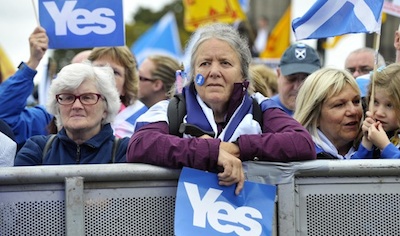
A fear campaign by the London establishment appears to have succeeded in preventing a vote in favour of Scottish independence, according to early results this morning.
Unionists won the contest in the first council to declare, the small council of Clackmannanshire in central Scotland recorded 19,036 votes for no to 16,350 to yes, amounting to a split of 54% to 46%. Turnout was 88.6% at the council.
In the northeastern Orkney Islands, unionists won the vote by a strong 67% of the vote to 33%. In the Shetland Islands, the ‘No’ vote won by an equally strong vote of 64% to 36%.
Earlier a post-exit poll suggested that the ‘No’ camp would secure 54% of the vote across Scotland, with the yes camp on 46%.
Turnouts hit record heights across Scotland: Inverclyde was at 87.4%, West Dunbartonshire reached 87.9%, Renfrewshire hit 87.3%, while Orkney reached 83.7%. However, turnout was lower in Dundee - expected to lean toward yes - at 78.8%, and there was a surprisingly low turnout in Glasgow of 75%.
Political debate tonight was focused on the need to redefine the so-called ‘United Kingdom’ to better reflect the reality of the needs and demands of the public in those lands still under London jurisdiction, especially the English. Westminster MPs based in England have expressed strong opposition to promises by the three London-based parties to allow ‘Home Rule’ powers to the Scottish parliament.
Irish interests remain acutely attuned to the possibility of a new political alignment within Britain. In the north-east of Ireland, where London continues to claim direct authority, repercussions could include a reduction in British Direct Rule and a reform of the unpopular Six-County devolved assembly outside Belfast.
Full results from the Scottish referendum will be published here as they become available tomorrow morning, and full analysis will be published in our regular weekly issue this weekend.
![[Irish Republican News]](https://republican-news.org/graphics/title_gifs/rn.gif)
![[Irish Republican News]](https://republican-news.org/graphics/title_gifs/harp.gif)

